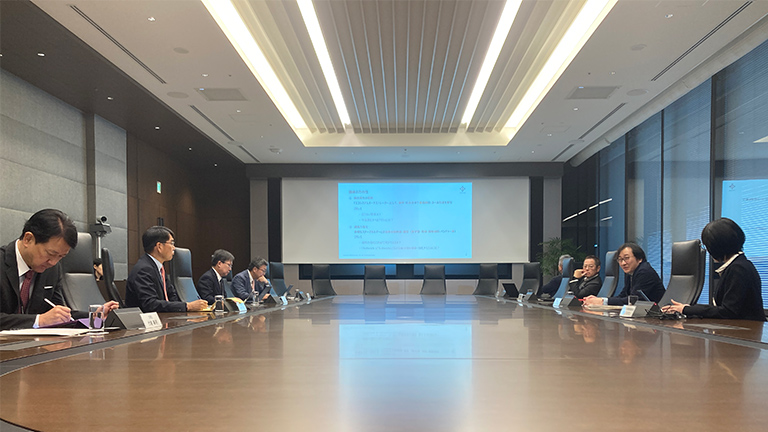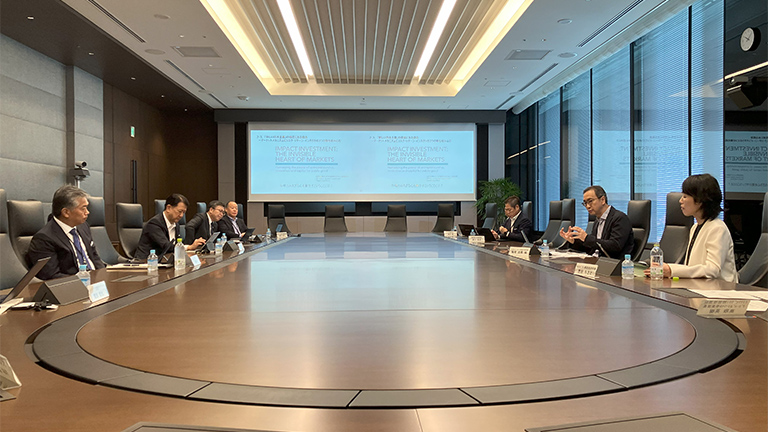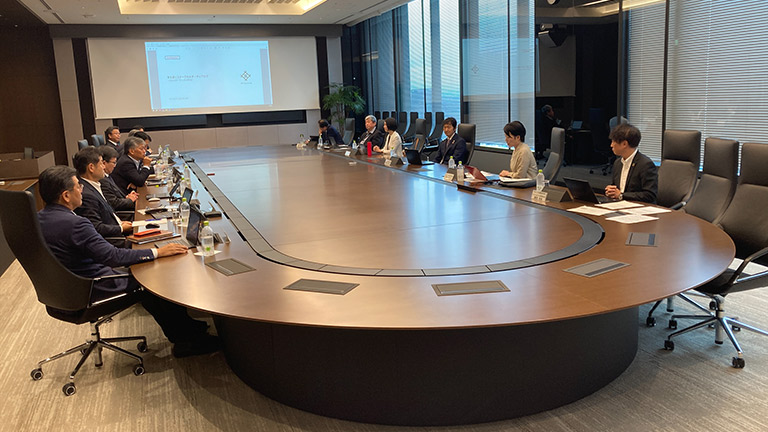Sustainability Management
Mitsui & Co.’s Stakeholders
Mitsui & Co. places emphasis on interacting with and having dialogue with society. For this reason, we closely assess the effects of our diverse and global business activities on society and identify and acknowledge stakeholders of particular interest.
In particular, we are committed to the development of relationships based on mutual trust with a diverse range of stakeholders, including local communities, business associates & consumers, NPOs & NGOs, employees, shareholders & investors, and government bodies, through proactive information disclosures and continual communication with our stakeholders.
Through interactive communication with stakeholders, each of Mitsui's employees and officers is endeavoring to acquire a firm understanding of what society expects from and requires of Mitsui. Based on this understanding, we strive to respond to changes in market environments, and constantly evolve to create new value through our business activities by exercising our unique capabilities, and thereby contribute to the realization of a sustainable society.
Please scroll horizontally to look at table below.
| Stakeholders | Overview | Communication |
|---|---|---|
| Local Communities | We contribute to the sustainable growth and development of societies and economies through our wide-ranging business activities and society-centric contribution activities in countries and regions throughout the world. We also aim to achieve harmonious coexistence with local communities through contributions in such areas as local industry development, creation of employment opportunities, infrastructure development, enhancement of the quality of life of local residents, and the improvement of educational environments. |
|
| Business Associates & Consumers | We identify the needs and expectations of our business associates and consumers, supply safe and reliable products and services, disclose accurate corporate information, and take measures to address problems in supply chains. |
|
| NPOs & NGOs | We pursue solutions for environmental and societal issues through networking and collaboration with various NPOs and NGOs. |
|
| Employees | In order to support our diverse group of employees to work energetically and exert their capabilities, we strive to carry out diversity management by enhancing workplace environment, developing various internal rules, providing human resources development programs, and placing the right people in the right positions. We are committed to being an organization with integrity on a global group basis with each employee possessing a high level of awareness of compliance. |
|
| Shareholders & Investors | We strive for continuous improvement of our corporate value and appropriate market recognition by realizing transparency and accountability in management with timely and accurate disclosure of information, and by engaging in interactive communication with shareholders and investors. |
|
| Government Bodies | We are committed to complying with related laws and regulations formulated by government agencies and local governments of Japan and the countries and regions where we engage in business activities. Furthermore, through cooperation with governmental agencies and local governments, we propose and promote business projects that align with their policies and make efforts to contribute to the development of nations and industries in a way unique to Mitsui. |
|
Stakeholder Dialogue
To promote sustainability in our corporate management, we believe it is crucial to conduct dialogue with various stakeholders and respect their opinions regarding our business activities. We have continued to hold Stakeholder Dialogue sessions since 2019, as a way to facilitate interactive dialogue between our stakeholders and our employees and officers. To date, we have engaged in dialogue with external experts such as university professors and attorneys, and representatives of various NPOs and NGOs, as well as with the next generation of young leaders, including those representing Gen Z.
Note: Titles were current at the time of the event
Stakeholder Dialogue for the Fiscal Year Ending March 2026: "Integrated Business Strategy for Building a Sustainable Future"

In October 2025, a stakeholder dialogue session was held with Professor Yuya Kajikawa of the Institute for Future Initiatives of The University of Tokyo, titled "Integrated Business Strategy for Building a Sustainable Future". During the session, Professor Kajikawa spoke about the evolution of perspectives on innovation, the importance of rule-making, and the expectations for trading companies to serve as business Ecosystem Orchestrators. He also provided several discussion points regarding our sustainability initiatives, prompting an active exchange of views among participants.
The importance of corporate initiatives in the field of sustainability, including climate change and natural capital is increasing more than ever. As a trading company that engages with a wide range of stakeholders, we are increasingly expected to play a role and contribute as a business Ecosystem Orchestrator in international and collaborative rule-making. Furthermore, by broadening our approach to research and development beyond technology to include rule-making, we can strengthen our capability to absorb and utilize knowledge within the organization. We also deepened discussions on how to empower talented individuals to collaborate with external organizations and drive initiatives forward, offering valuable insights into the roles our company should fulfill going forward.
Stakeholder Dialogue in the Fiscal Year Ending March 2025 – What are the ideal social contribution activities for corporations and how should they be positioned?

In September 2024, a stakeholder dialogue session was held between Mr. Masataka Uo*, who is the President of the Japan Fundraising Association and a member of Mitsui & Co. Sustainability Advisory Board, and members of the Mitsui & Co. Sustainability Committee, on the theme of "What are the ideal social contribution activities for corporations and how should they be positioned?" During the dialogue session, Mr. Uo spoke about trends in philanthropy, social contribution activities, and impact investing, etc. in the international community. He then provided several discussion points regarding the positioning of Mitsui & Co.'s social contribution activities, and the participants vigorously exchanged their views.
Mitsui & Co. advocates providing realistic solutions to global social issues through its business activities and strives to create a positive impact through its business. Mr. Uo expressed his hopes that as a global investment and trading company that has connections with all kinds of stakeholders, Mitsui & Co. will also promote collaboration and co-creation (collective impact) between various companies in the area of social contribution activities and societal problem solving. The participants discussed the importance of accumulating and sharing knowledge on measuring and managing environmental and social impacts, as well as methods for taking on the challenges of solving societal issues by combining and fusing the strengths of both philanthropy and business activities. Mr. Uo also suggested that social contribution activities could bring deeper awareness of societal issues or provide a venue for human resource development, and that the gratitude received in carrying out these activities or the interactions with diverse people in these activities could lead to an increase in well-being, which would enable Mitsui & Co. officers and employees to further exert their capabilities.
Stakeholder Dialogue in the Fiscal Year Ending March 2024 – Expectations for Business and Human Rights

In July 2023, we facilitated a stakeholder dialogue event on the theme of business and human rights, where members of our Sustainability Committee were joined by Akiko Sato*, Liaison Officer – Business and Human Rights at the United Nations Development Programme and Attorney at Law at KOTONOHA Law Office, and Daisuke Takahashi*, Attorney at Law at Shinwa Sohgoh Law Offices and member of our Sustainability Advisory Board.
During the dialogue session, Ms. Sato talked about the expectations of external stakeholders regarding respect for human rights, and Mr. Takahashi discussed trends in the formation of rules regarding business and human rights in various other countries, their impact on Japanese companies, and expectations for Mitsui. This was then followed by a lively exchange of opinions.
The participants shared the importance of further spreading awareness of human rights as a basic right of every individual, and those efforts to resolve human rights issues are an integral and desired part of business. At the same time, given that human rights issues require efforts that take into account the varying structural and legal systems of each region, along with social and cultural context, they acknowledged that not all issues can be resolved in the short term, and discussed the need to set priorities and patiently continue initiatives to address each issue from the standpoint of the rights holders, while taking into account international standards such as the UN Guiding Principles and the national laws and regulations of each country.
Both guests also expressed their hopes for Mitsui to lead Japanese companies by promoting good practices in resolving human rights issues through its activities across a wide range of industries around the world, sharing such practices with stakeholders, and communicating its effort in a transparent manner.